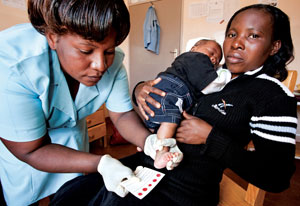Scientists must transfer findings to practice more quickly
March / April 2013 | Volume 12, Issue 2
Too often, global health scientists overlook the opportunity to leverage their research by ensuring it informs health policymakers or program implementers in order to spur actions that benefit health.
"Moving science advances quickly into treatments on the ground is critical and especially challenging in low-resource settings," said Fogarty Director Dr. Roger I. Glass. "From the start of any project, we need to encourage strong links between researchers, implementers and policymakers and regard the implementation of science into policy as a key measure of success. After all, the primary reason for global health research is to improve human health."

Photo by James Pursey/USAID
To ensure scientific findings are quickly implemented
to improve health, researchers must include
policymakers from the start of their projects.
The nexus between science and implementation was the focus of a recent Fogarty advisory board discussion intended to inform development of the Center's new strategic plan. Implementation science is a key priority for Fogarty and is woven into many of its research and training programs.
The time is ripe for researchers to engage with implementers, according to Dr. Stephen Morrison of the Center for Strategic and International Studies (CSIS), who cited the Obama administration's elevation of global health. "Science has become more sexy to policymakers," he noted. "We are seeing a real appetite for understanding what this translation looks like."
In order to influence policymakers, scientists must change the academic model of simply conducting research and publishing papers, observed Dr. Laura Guay, of the Elizabeth Glaser Pediatric AIDS Foundation. "We need a bi-directional model, where researchers work with, and learn from, people on the ground rather than coming to dictate what will be done."
This means involving people from the government, public health, nonprofits and other stakeholders from the start and as the project progresses, essentially making them researchers, she said. They should be part of deliberations about the country's health needs and its research priorities, she added.
At the same time, the research team should see themselves as policymakers and program implementers, targeting their project to affect change in the country at hand. For this, they need to understand local culture, politics and customs and continually disseminate the research results. "The current challenge to the field is not in the science, but in the implementation of what we know," she said.
Nowhere is this lack of implementation more disheartening than in HIV/AIDS, specifically in an infected mother's transmission of the virus to her baby, according to Dr. Michael Johnson, Fogarty deputy director, who spoke in his capacity as the President's Emergency Plan for AIDS Relief (PEPFAR) liaison to the Global Fund. Even though effective treatments are available for HIV, tuberculosis and malaria, many are still dying. "We continue to have ridiculous infection rates, ridiculous missed opportunities," he said.
PEPFAR and the Global Fund, by establishing a broad network of HIV care centers and capacity, are in essence also creating a central system for health treatments and primary care services, Johnson noted. But for this to function effectively, scientists must understand how to use their data for program refinement and improvement, Johnson said. "We really need to up our game."
Dr. King Holmes, Fogarty board member and grantee at the University of Washington, cited another example of how implementation has lagged behind discoveries. Although the human papilloma virus vaccine protects women against cervical cancer, many women - especially in developing countries - are not vaccinated. "Nobody's doing that," he said. "It's shocking."
More Information
To view Adobe PDF files,
download current, free accessible plug-ins from Adobe's website.